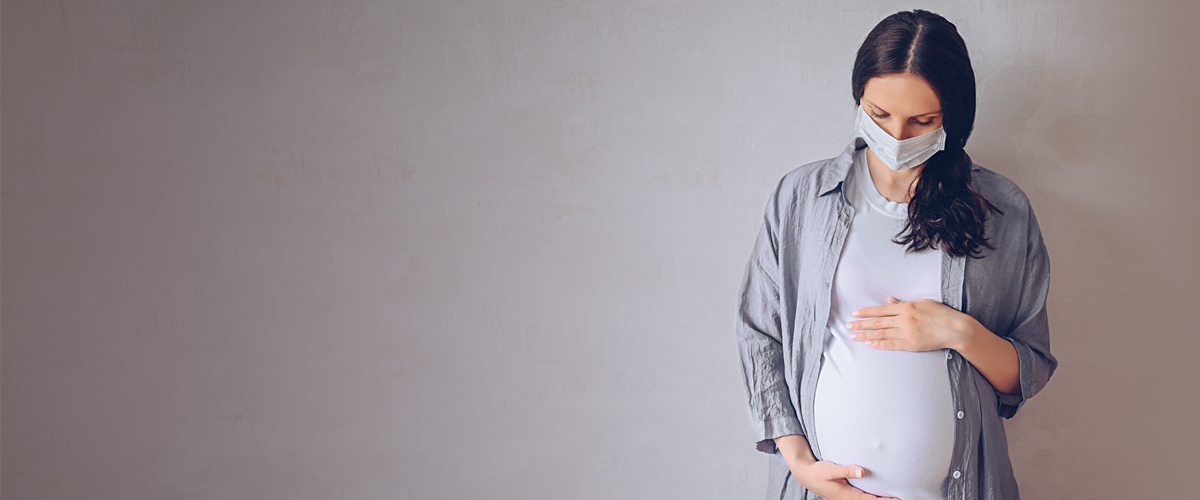COVID-19 Vaccine and Pregnancy Update: What You Need to Know
An expert discusses the effects of the virus and the safety of COVID-19 vaccines in pregnancy.

Nearly three years into the COVID-19 pandemic, the effects of the virus – and the safety of COVID-19 vaccines – in pregnancy are coming into clearer focus. Accumulating research from tens of thousands of pregnancies shows that the vaccines, which were approved by the Food and Drug Administration (FDA) in 2021, help protect the mother from getting very sick and are safe for both mother and baby, says the Centers for Disease Control and Prevention (CDC).
“The data should be very reassuring to pregnant women,” says Dr. Laura Riley, obstetrician and gynecologist-in-chief at NewYork-Presbyterian/Weill Cornell Medical Center. “It also shows that there may be even more benefit to the vaccine, because the vaccine protects not only you, it protects your baby as well.”
At the same time, mounting research shows that getting COVID-19 during pregnancy can lead to harmful consequences for both mother and baby.
“A wealth of data has accumulated demonstrating that COVID-19 in pregnancy may be detrimental to maternal and fetal health,” says Dr. Riley.
Dr. Riley, who is also the chair of the Department of Obstetrics and Gynecology at Weill Cornell Medicine and a member of the COVID-19 expert work group at the American College of Obstetricians and Gynecologists (ACOG), shared with Health Matters what those who are pregnant, thinking about getting pregnant, or lactating should know about COVID-19, vaccines, and the booster shot.

Dr. Laura Riley
What do we now know about the effects of COVID-19 infection during pregnancy?
Research shows that the consequences for mothers include an increased risk of pneumonia and severe illness leading to hospitalization, intensive care, intubation, and in rare cases death. Some studies have identified increased risks of preeclampsia, which causes dangerously high blood pressure. COVID-19 infection also increases the risk of prematurity and stillbirth.
What do we know about the latest omicron variants and subvariants during pregnancy?
There is limited data on the omicron variant in pregnancy and even less on the newer subvariants. Available data supports our experience with patients, which is that the omicron variant results in less severe infections than previous variants. That is consistent with the experience of people who aren’t pregnant. Importantly, vaccination also significantly decreases the chance of a severe omicron infection.
What is the vaccine recommendation for pregnancy?
The CDC and the leading pregnancy associations, ACOG and the Society for Maternal-Fetal Medicine (SMFM), say if you are pregnant, you should be fully vaccinated and receive a booster to optimize the safety of your pregnancy. ACOG and SMFM recommend that pregnant people get the updated bivalent vaccine. Pregnant people should get it after they’ve received their last COVID-19 primary vaccine dose or the original monovalent booster, ACOG says. Follow the CDC schedule for the right timing.
What has research on COVID-19 and pregnancy shown?
Data on both the safety and efficacy of the vaccines in pregnancy is very reassuring. COVID-19 vaccines have not been associated with miscarriage, preterm delivery, stillbirth, or birth defects. Vaccination in pregnancy results in maternal protection against COVID-19 and transfers protective antibodies to the baby, regardless of the timing of vaccination during pregnancy. Recent data also demonstrate that vaccination during pregnancy decreases the chance of the infant testing positive for SARS-CoV-2 and, in the first six months of the baby’s life, of hospitalization due to COVID-19.
Should breastfeeding mothers get the vaccine?
Breastfeeding mothers should also receive a COVID-19 vaccine series and a booster in accordance with CDC recommendations. There’s no evidence that the vaccine gets into breast milk and can in any way get to the child. We give vaccines to lactating women all the time. And we definitely don’t want people to stop breastfeeding to get the vaccine. In fact, research shows that vaccinated mothers who are nursing pass through breast milk antibodies that may help protect their babies from COVID-19.
The data should be very reassuring to pregnant women.
Dr. Laura Riley
Should people who are planning to get pregnant have reservations?
No. They should just go ahead and get it done. If by chance you become pregnant between your doses, you should complete the series and get the maximum benefit from the vaccine. The last thing a pregnant person needs is to be in the first trimester and get COVID-19. We know that the vaccine is the best possible protection against COVID-19, and vaccination during conception and the first trimester is not associated with any harm to the developing fetus.
Can the COVID-19 vaccine cause infertility?
There is no evidence that COVID-19 vaccines can cause infertility. In clinical trials and among the millions of people who have received the vaccine, we’ve seen no link between the vaccine and a loss of fertility. The American Society for Reproductive Medicine recommends the vaccine for those seeking to become pregnant, with no changes to the vaccine schedule.
When should pregnant people get the vaccine?
Get it as soon as you can. If you haven’t been vaccinated prior to pregnancy and then you get pregnant, get it. Data doesn’t suggest that there is a preferred time for vaccination in pregnancy to optimize the outcome for the mother and fetus, and you want to protect yourself and your baby during pregnancy. Our own published study of people vaccinated during or right before pregnancy found antibodies in umbilical cord blood at the time of delivery, regardless of when they got their first vaccine dose, suggesting that you should not wait until later in your pregnancy to get the COVID-19 vaccine. The antibodies in the umbilical cord blood resulting from a mother’s vaccination are passed along to the fetus and may help protect the baby as well.
Are trials being conducted in pregnant people?
Yes. The National Institutes of Health (NIH) is conducting a study called MOMI-VAX to evaluate the immune response of COVID-19 vaccination during and after pregnancy at multiple sites across the country, and vaccine makers are conducting trials.
How will safety continue to be studied?
There’s already a really robust safety system for vaccine development and surveillance in the U.S. There are many different safety systems that either patients or their providers can feed information into after a vaccine and say, “I had this complication,” if there was one. For COVID-19 vaccination specifically, the government added a new system named V-safe, which includes built-in pregnancy questions. One study used V-safe data of 35,000 pregnant people who received the mRNA COVID-19 vaccine and didn’t find any safety concerns for mothers or babies. The other thing to know is that there’s a group at the CDC that is tasked with looking at the data from all these safety systems and reporting on anything we see that is of concern.
Research on Vaccine Safety and Benefits in Pregnancy
- A review of several studies representing 40,978 pregnant individuals found that vaccination reduced the risk of COVID infection and COVID-related hospitalization during pregnancy by 50% and posed no safety risks to mothers or their babies.
- A CDC study of 46,079 pregnancies showed that COVID vaccination did not increase the risk of preterm birth or having a baby that was smaller than average.
- A large review of studies including close to 2.4 million pregnant persons found no evidence of pregnancy-associated safety concerns of COVID-19 vaccines.
- Data involving 4,399 pregnant persons concluded that COVID vaccination in pregnancy had no adverse effects on the pregnancy or outcomes.
- A study of 18,477 pregnancies found no evidence of an increased risk for early pregnancy loss after Covid-19 vaccination.
- An analysis of 23 studies demonstrated that COVID-19 vaccination in pregnant and lactating people did not cause adverse pregnancy outcomes for mothers or babies, and was effective at preventing COVID-19 infection.
- CDC data showed that infants of mothers who received two doses of an mRNA COVID vaccine during pregnancy were less likely to be admitted to the hospital for COVID in the first six months of life.
- A study found that infants born to mothers who were vaccinated against COVID-19 during pregnancy had a lower risk of testing positive for the virus.
- A study by Weill Cornell Medicine and NewYork-Presbyterian researchers of almost 1,400 people vaccinated during or right before pregnancy found SARS-CoV-2 antibodies in the umbilical cord blood at delivery, regardless of the timing of their first dose.
Additional Resources
For more information on COVID-19 vaccines for people who are pregnant or breastfeeding, read the recommendations of the CDC and the American College of Obstetricians and Gynecologists.
Learn more about women’s health at NewYork-Presbyterian and on Health Matters.
Laura Riley, M.D., is obstetrician and gynecologist-in-chief at NewYork-Presbyterian/Weill Cornell Medical Center and chair of the Department of Obstetrics and Gynecology at Weill Cornell Medicine. Dr. Riley is chair of the American College of Obstetricians and Gynecologists’ Immunization and Emerging Infections Expert Work Group and has served as a member of the Advisory Committee on Immunization Practice at the Centers for Disease Control and Prevention. She is the author of two books, You and Your Baby: Pregnancy and You and Your Baby: Healthy Eating During Pregnancy.
